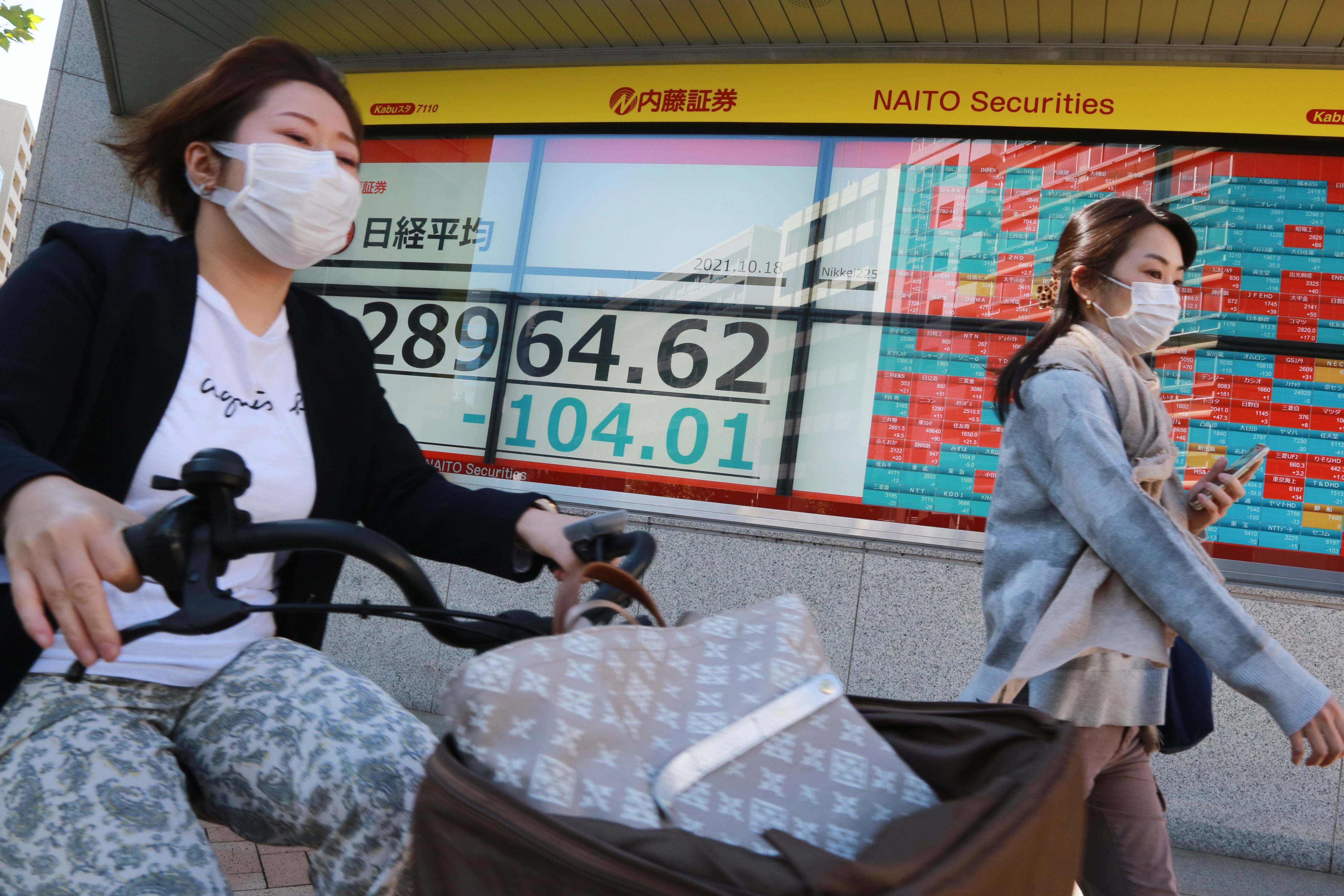Asian shares slide as Chinese growth data disappoints
Asian shares are mostly lower after China reported its economy grew at a meager 4.9% annual pace in July-September

Your support helps us to tell the story
From reproductive rights to climate change to Big Tech, The Independent is on the ground when the story is developing. Whether it's investigating the financials of Elon Musk's pro-Trump PAC or producing our latest documentary, 'The A Word', which shines a light on the American women fighting for reproductive rights, we know how important it is to parse out the facts from the messaging.
At such a critical moment in US history, we need reporters on the ground. Your donation allows us to keep sending journalists to speak to both sides of the story.
The Independent is trusted by Americans across the entire political spectrum. And unlike many other quality news outlets, we choose not to lock Americans out of our reporting and analysis with paywalls. We believe quality journalism should be available to everyone, paid for by those who can afford it.
Your support makes all the difference.Asian shares were mostly lower on Monday after China reported its economy grew at a meager 4.9% annual pace in July-September.
The Shanghai Composite index lost 0.2% to 3,565.18 while the Hang Seng in Hong Kong declined 0.5% to 25,217.81.
Chinese growth is under pressure from government controls meant to curb energy use and reduce financial risks from reliance on debt-fueled property developments. Manufacturing also has been hampered by shortages of processor chips and other components due to the pandemic.
The 4.9% annual pace of growth was slightly below forecasts and compared with a 7.9% expansion in the April-June quarter, which was exaggerated by the downturn in 2020.
“The growth outlook has weakened due to the various headwinds," Tommy Wu and Louis Kuijs of Oxford Economics said in a report. They forecast that growth would “slow significantly" in the current quarter.
Power shortages might persists, while other disruptions to manufacturing supply chains will likely ease. Weakness in the real estate sector, with major developer China Evergrande Group struggling to meet its debt obligations, would also slow activity, they said.
New Zealand's benchmark edged 0.1% lower after figures showed prices jumped 4.9% in July-September from a year earlier. It was the fastest pace of inflation since early 2011.
The figures add to pressure on New Zealand’s central bank to keep hiking rates after it raised the benchmark rate earlier this month for the first time in seven years by a quarter point to 0.5%.
Investors remain uneasy that price increases in many countries could lead to “stagflation,” or a stagnating economy coupled with high inflation.
Other regional shares also fell. Tokyo's Nikkei 225 index gave up 0.2% to 29,025.46. In Seoul, the Kospi lost 0.3% to 3,006.68.
The S&P/ASX 200 in Sydney rose 0.3% to 7,381.10. India's benchmark rose 0.9% to 61,854.45.
On Friday, Wall Street added to its recent gains, with the benchmark S&P 500 posting its best week since July.
The S&P 500 rose 0.7%, while the Dow Jones Industrial Average rose 1.1% and the Nasdaq composite gained 0.5%.
Positive company earnings dovetailed with a report showing people spent much more at U.S. retailers in September than analysts had expected. Sales at stores, restaurants and other retail establishments rose 0.7% from August instead of falling, as economists forecast.
The S&P 500 is back within 1.5% of its all-time high after a shaky few weeks as worries about stubbornly high inflation, reduced support for markets from the Federal Reserve and a slowing economy knocked stock prices around.
Early indicators from earnings reports have been encouraging. All but one of the 19 companies in the S&P 500 that reported quarterly results last week topped analysts’ profit forecasts. Such strength is crucial after climbing interest rates heightened worries that stock prices had grown too expensive relative to profits.
Treasury yields rose following the much stronger-than-expected report on retail sales. The yield on the 10-year note climbed to 1.60% early Monday from 1.57% late Friday.
The price of benchmark U.S. oil rose 93 cents to $83.21 per barrel in electronic trading on the New York Mercantile Exchange. It surged 1.2% to $82.28 per barrel on Friday, continuing a powerful run that has sent it up more than 70% this year and fanned worries about high inflation.
Brent, the global benchmark for crude, climbed advanced 60 cents to $85.46 per barrel. It jumped 1% on Friday, though the price of U.S. natural gas fell 4.9%.
The U.S. dollar rose to 114.34 Japanese yen from 114.22 yen late Friday. The euro fell to $1.1576 from $1.1602.
___
AP Business Writer Joe McDonald in Beijing and Associated Press writer Nick Perry in Wellington contributed.